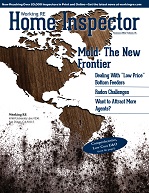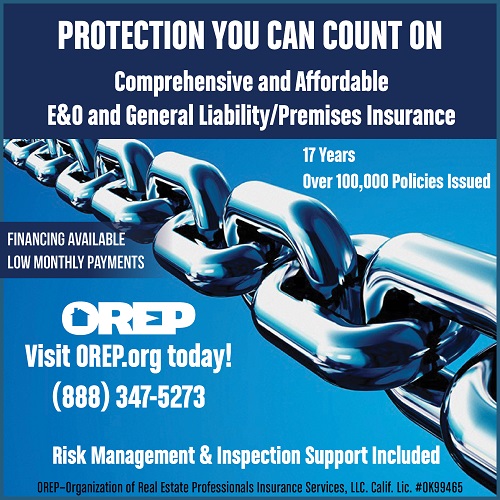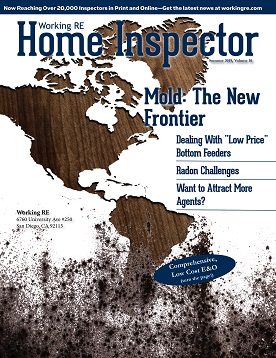 |
> E&O/GL Insurance for Home Inspectors Competitive Rates, Broad Coverage, Free Risk Management, online inspection support for tough questions, discounts on education and more… Professional Coverage, Competitive Pricing Shop OREP today! |
Insider’s Take on Home Inspection Legislation
by Joel Kleefisch, Director of Government Affairs at AAAHI
What does it take to get lawmakers on board in your state with enacting legislation to better regulate the home inspection industry? Here’s what you need to know.
If I had a nickel for every time I heard the following or some version of it, I could have retired after my 14 years in elected office: “If only our elected officials would listen to their voters instead of acquiescing to those evil special interests!” Here’s what you may not understand.
The term “special interest” is nearly always used as an extreme negative. The truth is that everyone has special interests…interests that are special to them. If you enjoy the latest lemon-berry infused lager, micro-breweries are a special interest to you. If your family goes leisure boating on the weekends, the inland marine industry is one of your family’s special interests. You get the point. So what does this have to do with enhanced training and licensure for home inspectors? Well, laws that govern every industry are made by human beings who not only have special interests of their own but have a propensity to listen to people they trust about the special interests they’re peddling. Enter lobbyists, government affairs specialists, government relations managers or whatever euphemism you’d like to insert.
In the vast majority of cases, when an industry is paying someone to represent their interests to those who make the laws, they are paying for the chance to educate policymakers on what they believe is a legitimate reason to support their industry or cause. Very seldom, in fact, it’s rare for any company, industry or other interested party to pay a government affairs liaison to push for something they don’t believe is ultimately good. The difference, of course, lies in beliefs that some interests deliver a greater good than others. Home inspectors by and large are driven to the industry because of a belief in a sound home buying process. They tend to care about the safe and sturdy habitation of the future resident clients, and they know hard work, knowledge and best practices can earn them an honest, healthy income. Those are all good things and selling the improvements of integrity for this business should be easy, right? Not so fast.
In 2004 I was first elected to the Wisconsin State Assembly; I served seven two-year terms. In those 14 years I chaired the Criminal Justice Committee, sat on the Joint Finance Committee, chaired the Committee on Natural Resources and Sporting Heritage, and sat on several other committees. Additionally, my wife Rebecca Kleefisch was elected Lieutenant Governor in 2009 and governed from the executive branch for eight years. Needless to say it was a family affair and we had our share of interaction with lobbyists from a myriad of industries. From farmers to road builders, fishermen to convenience store owners, cable television providers to disability rights advocates, everyone wants their piece of the pie. This is where the difficulty of getting your industry’s initiative to the governor’s desk begins. Hundreds of great ideas die every session because they don’t fit into the small legislative time window before the whole process shuts down to allow everyone ample time to campaign and run for their jobs again.
(story continues below)
Legislative Success
If you make the first hurdle, what’s the best way to get your initiative to the governor’s desk and have it met with a signing pen rather than a veto? It’s a multi-pronged approach that starts with a concise proposal. Lawmakers’ heads are filled with a million ideas and pitches from everyone and their neighbors. They are constantly bombarded by the phrase, “You know what you should do?” Having specifics at the ready that are spelled out in three or four simple sentences is a great start. “Our licensing bill would require a combination of classroom, online and field training and be validated by a thorough exam.” Followed by a reason the bill is the logical choice for the lawmaker and the constituents they represent.
“We know you support bringing the highest level of integrity to one of the most important aspects of the home buying process.” How could they possibly say no? There are many things to consider before the pitch is made. The most important cog in this wheel is very often a personal relationship. Do you or anyone in your industry have a lifelong buddy in the legislature, a former classmate or even an acquaintance? This is where a lobbyist can be effective. It’s the lobbyist’s job to know the legislators: what they like, what they can’t stand and how they Working RE Inspector Summer 2019 31 voted on past measures that may indicate how they will receive your idea. These relationships are what will help you get in the door. It’s not a coincidence that lobbyists are paid well for their services. Often a face-to-face meeting with the sitting legislator is the difference between getting your idea on the tracks and being dead in the water. It’s human nature that saying no is much more difficult in person than over an email or phone call. Access to the actual representatives and senators can be a tough nut to crack, but personal relationships and communications are still, by far, the most effective.
Still, the Promised Land is still a hearty trek. One of the most prominent sayings among government affairs types is, “It’s much easier to kill a bill than pass one.” In other words, it’s much easier to find one person throughout the arduous process who will hold their caucus hostage or simply not agree to schedule a bill for a hearing than it is to get a majority of people in the room to agree with you that your bill is the greatest thing since sliced bread.
Next, even if you have personal relationships and access to people who will ultimately vote yes or no to your idea, are they the right people? Do they sit on a committee that will vote your bill on to the full State House? Are they in the majority or the minority? Are they tenured enough to be taken seriously but not considered a “skater” — in it for the paycheck and the pension and unwilling to rock the boat in any direction? Remember all along, especially the higher the bill climbs, anyone from the Speaker to the freshman member can throw a fit and get your bill killed. It’s much more fragile when it comes to the Speaker of the State House or the Majority Leader of the Senate. Either one of them can singlehandedly say they just don’t like it or decide it’s just not a priority this session.
In the interest of full disclosure, I am the Government Affairs Director for the All-American Association of Home Inspectors. Because I have pre-political life experience as a television news reporter for the ABC affiliate in Milwaukee, Wisconsin, I also write and produce videos, conduct lobbying efforts and write articles like this one. It’s a fascinating and frankly fun mixed bag. Our legislative goals are to enhance training and require licensure for home inspectors in Wisconsin and the nation. We are leaning on personal relationships to get our bill as far through the process as possible and hopefully to the Governor’s desk. We have had strategy meetings with several legislative members who sit on the Real Estate and Housing Committees. In doing so we found a few members had personal stories where a home inspection went south. One of those representatives has now agreed to draft our bill, and the Chairman of the House Committee has agreed to have a hearing. This is about as good of a start as we can hope for.
Public Opinion
I’d be remiss not to mention an obvious factor that can have immense effect on whether your initiatives are successful: the court of public opinion. This is why any good government affairs strategy includes public relations. Earned media, social media, purchased media, and constantly changing public attitudes can buoy or sabotage your efforts. For example, part of our efforts includes a sincere concern for the men and women serving in the military. That appreciation parlayed with efforts to aid a military support organization not only do good but look good. Many lawmakers care deeply about the perception by the public that they are doing a good job. A handful of letters, emails or phone calls can calm or set them in a tizzy. Orchestrating and executing a public perception campaign, if not critical, must at least be a weapon in the arsenal, especially if a public campaign against your interests is mounted.
Although this is a nutshell version of one guy’s opinion and there is no specific clear path to victory, remember that nothing is more effective than looking someone in the eye, shaking their hand and saying, “You know what you should do?”
Free Risk Management Online Course Claims and Complaints: How to Stay Out of Trouble
Available Now
Presenter: David Brauner, Senior Insurance Broker OREP
David Brauner, Senior Broker at OREP, shares insights and advice gained over 25+ years of providing E&O insurance for inspectors, showing you how to protect yourself and your business. Watch Now!
About the Author
Joel Kleefisch works with the All-American Association of Home Inspectors (AAAHI) as the Director of Government Affairs. Joel has over two decades of legislative experience under his belt, having served Wisconsin as a State Representative of the 38th Assembly District. Joel has authored and co-authored several pieces of legislation.
Note: The Summer 2019 issue of Working RE Inspector is mailing now to over 20,000 home inspectors nationwide. OREP Insureds enjoy guaranteed delivery of each print magazine and many more benefits.
OREP Appraiser E&O insureds enjoy it free and this year Free Approved Continuing Education!!



